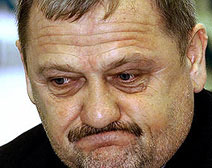|
Profile: Akhmad Kadyrov
(Agencies)
Updated: 2004-05-10 09:36 Chechen leader Akhmad Kadyrov, assassinated
in a bomb attack on Sunday, had been a top target of anti-Russian guerrillas
since he abandoned armed separatist rebellion to seek a peace within Russia.

Akhmad
Kadyrov, from
an armed separatist to a peacemaker
[AP] | Kadyrov, 52, bearded and thickset
often wearing a traditional sheepskin hat, interrupted his studies in a Muslim
university in Oman in 1991 to join the rebellion at home and rose to the key
position of mufti, a respected spiritual leader.
In that position he proclaimed a jihad (holy war) against Russia in 1995. The
following year Russian troops withdrew from Chechnya after an agreement that
ended a bloody and, for Moscow, humiliating war.
But three years later he accused rebel leaders of fostering militant Islam
and switched over to the side of President Vladimir Putin, then Russian prime
minister, who launched a fresh war in Chechnya in October 1999.
Kadyrov, from then on "enemy of the nation number one" for the rebels, was
elected regional president in October under a Kremlin peace plan and maintained
a tough grip on Chechnya.
In past weeks he had been campaigning for the withdrawal of most Russian
forces and handing over the formal control over Chechnya to his armed
supporters.
After siding with Russians he survived a series of assassinations, including
one by a woman suicide bomber.
But he was killed in a bomb attack on Sunday in a sports stadium during
celebrations marking the Soviet Union's 1945 victory over Nazi Germany. At
least 20 other people also died.
"Kadyrov passed away on the day of our national holiday and he passed away
undefeated," a solemn-looking Putin told Kadyrov's son Ramzan at a Kremlin
meeting.
"He was a truly heroic person," Putin added in televised comments. "By his
activities he convincingly proved that the bandits and the people cannot be put
on the same footing."
Apart from the rebels, Kadyrov had many opponents among Russian nationalists,
who believed he was given too much power with too little control in his home
province.
Over the past few months he had encouraged a series of voluntary surrenders
by the rebels, many of whom later joined his security forces.
Kadyrov's opponents in Moscow suspected him of creating his own military
force, overseen by Ramzan. But they also warned that his recruitment of
ex-rebels exposed his entourage to rebel "moles."
Born in 1951 in the Central Asian republic of Kazakhstan, where
Soviet leader Josef Stalin had exiled the entire Chechen nation on unproven
charges of collaborating with the Nazi invaders, Kadyrov studied at a series of
Islamic colleges.
In 1989, while Chechnya was still under Soviet rule, he set up the first
Islamic institute in Russia's North Caucasus and played a prominent role in the
religious revival of the independent-minded region.
In 1994 to 1995 he fought against Russian forces in rebel units until rebel
leader Dzhokhar Dudayev appointed him supreme mufti. In 1996 Kadyrov took part
in peace talks with Moscow, which ended in the Russian withdrawal from Chechnya.
He finally broke with the rebels after they raided the southern Russian region
of Dagestan in August 1999, provoking a new intervention which ended the
short-lived Chechen independence.
"(Russia) gave us everything that is Chechnya, (saying) do with it what you
will, but we did not use it properly," he told Reuters in an interview, when
asked why he changed sides.
Putin took the Chechen leader with him on a trip to the United Nations last
year and regularly appeared with him on nationwide television.
| |
 |
|
 |
|
|
Today's
Top News |
|
|
|
Top World
News |
 |
|
 |
|
|
|
|
|
|


